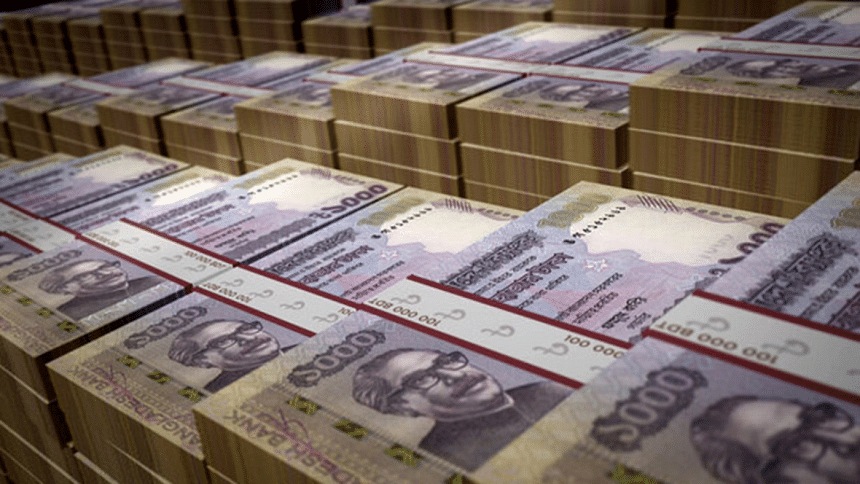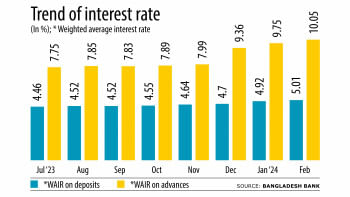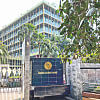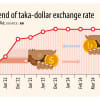Taka to trade more freely by next month

Bangladesh will introduce a crawling peg system by next month to make the exchange rate more flexible and improve the foreign currency reserves, a key prescription from the International Monetary Fund.
The crawling peg system is a method of exchange rate adjustments in which a currency with a fixed exchange rate is allowed to fluctuate to some extent. Typically, the system helps control currency swings, usually during threats of devaluation. Currency pegs are established by developing economies whose currencies are linked to the dollar or the euro.
Bangladesh Bank has already informed the IMF about the system being implemented for the taka.
Bangladesh entered an IMF loan programme for $4.7 billion in January last year. An IMF mission has been in Dhaka since April 24 to review the economic health of the country and whether it is meeting the loan conditions before the third tranche is released. The mission will also finalise new or revised conditions, which could include a lower reserves target.
A central bank high official said they were hopeful of launching the crawling peg system by June, as preparations were at the final stages. Since November last year, the IMF has urged Bangladesh to go for the system.
"I think where Bangladesh was struggling a little bit was the fact that while the current account was adjusting well, partly because they were restraints on imports and so on, the financial account wasn't doing very well," Krishna Srinivasan, IMF director of the Asia and Pacific, said on April 30 during a virtual briefing.
"You could see that in the bleeding of reserves and the taka coming under pressure. Now, it's important that the next stage of the reform agenda is to allow greater exchange rate flexibility, which would help you address the problems in the external sector in the financial account," he said. "Once you do that, you'll see a greater sense of stability coming back in the external accounts."
Although the central bank in its Monetary Policy Statement (MPS) in January mentioned introducing the crawling peg system, there had been no visible step in this regard.
The crawling peg system would be linked to a carefully selected set of currencies and operate within a predefined exchange rate band. This strategy is aimed at tempering unusual fluctuations in the currency's value.
"The central bank would establish a stable benchmark while retaining the flexibility to intervene in the market as necessary to maintain the currency within the designated boundaries," Bangladesh Bank said.
On paper, the central bank introduced the market-based exchange rate in July last year. In practice, however, the exchange rate is fixed by the Bangladesh Foreign Exchange Dealers' Association and the Association of Bankers, Bangladesh on unofficial instructions from the central bank.
The existing exchange rate was fixed about three months ago.
According to the central bank statistics, during the July-February period of the current fiscal year, the current account balance, a major component of the Balance of Payment (BoP), was in surplus by $4.7 billion.
In contrast, the financial account, another key part of the BoP that includes foreign direct investments and short-, medium-, and long-term loans, suffered an $8.3 billion deficit.
This is nearly four times the deficit from the same period a year ago, as shown by the central bank.
On the other hand, the net trade credit deficit stood at $10.75 billion in the same period, which was $3.55 billion in the same period of the last fiscal year.
According to the IMF assessment, the exchange rate not being market-based is the reason behind the deficit in the financial account. As a result, export proceeds were not coming to the country while remittances were coming through unofficial channels.
Since the launch of the IMF's loan programme, Bangladesh has been unable to meet the conditions set for net international reserves.
As Bangladesh could not meet the target set for June last year, the country had to get a waiver to secure the second tranche.
For the third tranche, the net international reserves target was revised down to $17.78 billion for December, but the country fell short by $58 million.
For the fourth tranche, the IMF set the net international reserves target for June this year at $20.1 billion.
Bangladesh is unlikely to meet the target.
In this context, the country has sought IMF's consideration to lower the latest net international reserves target as well. A central bank official said the visiting IMF mission, which leaves on May 8, has agreed to revise down the target. However, the figure has not been fixed yet.

 For all latest news, follow The Daily Star's Google News channel.
For all latest news, follow The Daily Star's Google News channel. 










Comments